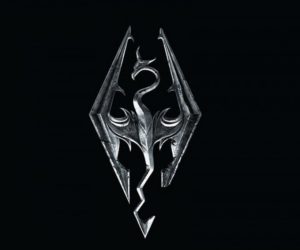Posted by Clark Kent Without Glasses in Criticism, Opinion, PC/video game, RPG | 0 Comments
Skyrim is the GOAT
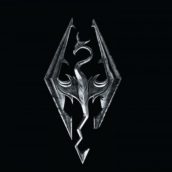
Being old and decrepit like a Draugr Deathlord, I only fairly recently became aware of the acronym “GOAT” (for fellow elderlings, it means “greatest of all time”). And now I’m here to explain why I believe that when it comes to PC and console RPGs, Skyrim is, in fact, the GOAT.
I can already hear the clacking of keyboards as other RPG fans question my age and experience with the genre. There seems to be a general climate in the RPG video game community where Skyrim is considered to be something for the kids and the plebeians, whereas the superior Patrician gamer will prefer a Morrowind or a Baldur’s Gate II. Well, to clarify, I’m about to turn 40 in a few months and the first RPG I ever played was called “Lands of Lore: The Throne of Chaos”. My first Elder Scrolls game was Daggerfall. I was there when Morrowind came out and purchased it right away. I also played almost every Bethesda, Bioware, Obsidian and Larian game that’s ever been released. I even played Gothic I and II, Drakensang, Two Worlds and other obscure European titles like Kult: Heretic Kingdoms. I’ve dabbled in MMORPGs like LOTRO, SWTOR and Guild Wars and tried ARPGs like Diablo and Torchlight but I just don’t understand the appeal of those. I think all of this is worth mentioning because it should clarify that I’m not calling Skyrim the GOAT just because I don’t know any better.
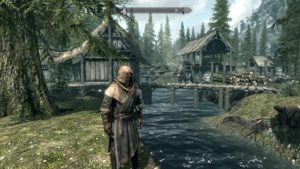
Now, I will grant that I’ve always been a casual player. I got into RPGs because I loved fantasy, not because I loved complex mechanics or challenging gameplay. For me, the whole point of an RPG is becoming an inhabitant of another world and getting immersed in that. That immersion and freedom is what I love about tabletop RPGs as well.
Interestingly, there seem to be opposite trends in the tabletop community compared to the video game community when it comes to RPGs (I’m talking about devoted fans here, the sort of people who frequent forums or use reddit and Discord to talk about gaming). In the tabletop world, there has been a strong push towards streamlined, elegant mechanics for a long time now, which allow players and gamemasters to focus on a shared storytelling experience without being bogged down by complexity. These days, few people have the time anymore for a really in-depth, simulationist type of game like you would have seen more of in the 80s and early 90s.
In video games, though, old-school roleplayers often lament that RPGs have become too casual and too streamlined, a process which is referred to as “dumbing down”. This has been happening for a long time as well. I remember when Oblivion came out and the Bethesda forum was full of complaints from people who missed the mechanical complexity of Morrowind. Dragon Age: Origins was dissed for being too user-friendly compared to the Baldur’s Gate series, and Mass Effect 2 got a lot of flak for doing away with a great deal of customisation and focusing on fluid gunplay instead of statistics.

Personally, I don’t think there is anything wrong with preferring mechanical complexity or prioritising character skill over player skill, but to me, that’s not what RPGs are primarily about.
I know the debate over “what makes a true RPG” is old and boring, and ultimately it just comes down to personal preference, so I’ll just describe what I myself expect from a roleplaying game.
What I want from an RPG is the ability to inhabit a character of my own making, use my imagination and explore a fantastic world where I get to do heroic things and see my character grow into a more powerful version of itself.
That means none of the Witcher games make the cut, because they force me into a single pre-established character with a very restricted range of playstyles and very limited progression. I get that a lot of people like those games, but in my estimation, they are only marginally more RPG-like than a Red Dead Redemption or something. To some, that might be considered akin to blasphemy.
But it gets worse.
I don’t think the Baldur’s series offers the true RPG experience according to my (highly subjective) definition of it. Neither does the Dragon Age series.
“What?!” “How…?” “I can’t even…”
It’s alright. I’m just one guy. Who cares about my opinion. But if you’re curious, allow me to explain my outrageous statement.
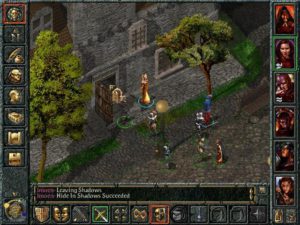
Baldur’s Gate and other such games were invented to provide an alternative to tabletop roleplaying. Nothing beats getting together with friends and rolling some funny-shaped dice, but it’s not always practically feasible, at least not back in 1998-2000 when the Baldur’s Gate games were released. However, in my opinion, these Infinity Engine games provide an experience that is nothing like actually playing D&D, even though they use the AD&D ruleset. Baldur’s Gate is about controlling an entire party of characters which you only see from high up like you’re one of the deities of the Forgotten Realms. In that way, it actually feels more like playing a small-scale RTS than an RPG. While there is a main character, the fact that this person is only represented by a small pixelated sprite and a portrait in a sidebar creates a lot of distance and keeps me from identifying with it. The isometric perspective in combination with the fact that I control the entire party utterly destroy any sense of immersion as far as I’m concerned. And look, I tried to love these games. I tried hard. I played for many hours, really tried to get into it, but it never worked out. The only isometric RPG I ever actually enjoyed was Divine Divinity, where you only control your protagonist and the camera is a bit closer so I can actually see what he looks like.
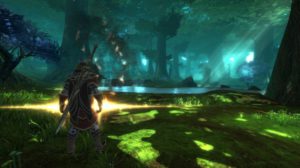
Over-the-shoulder titles like Knights of the Old Republic, Kingdoms of Amalur or Fable work better for me, but even they are never as immersive as a first-person title. It’s fairly obvious, but the feeling that I’m inhabiting a character is never better than when I’m looking through his or her eyes. Even though I suffer from motion sickness and can’t stand watching someone else play a first person game for very long, I love the experience of actually playing like that more than any other type of video game. (Tangent: yes, I know this sounds strange but I get nauseated much more easily when someone else is controlling the camera, because my brain can’t predict where it’s going to move. It’s worse on PC than on console, by the way, because the mouse allows for much faster camera movements).
The Elder Scrolls games are a rarity in that they’re first-person RPGs. For some reason, few developers make those anymore. Back in the day, you had Lands of Lore, Eye of the Beholder, the Might & Magic series and so on. These were usually grid-based but that didn’t matter since they firmly planted you as a player inside the game world. Like many isometric games, some of these titles also had you controlling an entire party, though, which is a bit silly and unrealistic. Not so in Elder Scrolls, where you are your character and that’s it. You can have followers, but they are clearly their own person, like an employee or guide would be in real life.
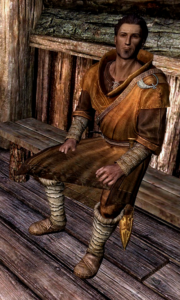
Okay, so we have the “inhabiting a character” bit. Then there is “of my own making”. As I said when I mentioned The Witcher, this is very important to me, and few games offer that experience to the extent that The Elder Scrolls does, and that includes Fallout.
I feel like Fallout was always intended to be more story-driven and thus a little less open-ended than the Elder Scrolls series. I never played the original 2D titles so I can’t say much about those, but in Fallout 3, you are destined to play as Liam Neeson’s child, and you grew up in a vault. In Fallout 4, you are bound to be a married army veteran who loses a spouse and child while in cryo. Obviously, Elder Scrolls games put you in a main narrative as well, but you always start out as an anonymous prisoner whose past is unknown. That allows you to make up who you were and what you did before the start of the game. Furthermore, the games give you the same sort of character creation freedom you would expect in a tabletop RPG. If I have one criticism of Skyrim, it’s that I wish you could make your character’s appearance more unique (without using mods, of course) but what is there is good.
Okay, so far it should be obvious why The Elder Scrolls is my favourite series when it comes to video game RPGs. But why Skyrim? Why not Morrowind or Oblivion? Or even Daggerfall, which I did play back in the day? My next step is to explain why I feel Skyrim is the best game in the series.
TES fans are old-fashioned curmudgeons (I am too, in many ways), which is why they will always say that the game that came out before the current one was the best entry in the series and the new one ruined it. This happened when Morrowind came out. Yes, more than a few Daggerfall fans hated it for making the world much smaller. The same happened when Oblivion came out. Morrowind fans complained that it had become too generic and dumbed-down. And when Skyrim came out, all of a sudden Oblivion was a timeless classic that could do no wrong. There is no doubt that when The Elder Scrolls VI comes along, no matter how good it is, fans will say Skyrim was better. There is a chance I will be one of them, but so far, I feel quite strongly that the Elder Scrolls series got better with each instalment.
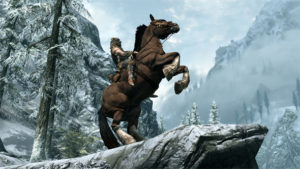
Daggerfall had a huge world, but it was lifeless. Only the towns and dungeons had anything to offer, but the wilderness as such was nothing more than a ridiculously oversized wasteland full of absolutely nothing, entirely defeating the point of having a large world in the first place.
Morrowind vastly improved on the concept of The Elder Scolls and finally offered a game where exploration was something worth doing. However, the combat system was absolutely horrible. There is simply nothing enjoyable about fighting in Morrowind, which in itself is enough of a reason for me never to play it again. On top of that, I hated the dialogue system, which felt like you were reading a Wikipedia article rather than having a conversation with someone. Finally, the NPCs of Morrowind, even though they were all named, were a bit dull in that they simply stood around a lot of the time and never did anything. The fact that there was very little voice acting also made it harder for me to get invested. To some, this may seem shallow, but I don’t care. I love reading books but looking at a silent character and reading their lines below just doesn’t do it for me. It makes me feel like the game isn’t finished (and yes, I grew up playing games that didn’t have voice acting, but I was really happy when it became more commonplace). When it comes to voiced protagonists, that’s a different matter, but so far we haven’t had that in The Elder Scrolls so I won’t go into it.
Oblivion was the first Elder Scrolls game that I got really excited about, and before Skyrim came out, it was my favourite game of all time. I loved everything about it and I still do to this day. The setting was wonderfully cozy and beautiful, while also offering enough darkness and danger hidden beneath it all. The combat felt like I was actually fighting monsters and the NPCs actually talked, even though the random conversations were often hilariously awkward and absurd. They also walked around and behaved like real people, even if they didn’t look like it yet. Oblivion really made me feel like I was a character of my own making inhabiting a gorgeous fantasy world where I got to do heroic stuff and grow into someone more powerful.
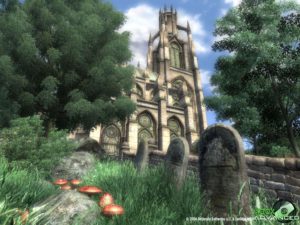
But Skyrim is better, and here’s why.
A lot of nostalgic Oblivion fans will point to the things that Oblivion had which were lost in Skyrim. Honestly, I don’t really miss any of them, but let’s go over some of these things.
- Spellmaking. Yeah, that was cool, and I’m not sure why Skyrim ditched it altogether. Out of everything that fans miss, this is the one I understand the most. It was pretty nice, albeit often hilariously overpowered, to be able to create your own spells. Do I really miss it, though? Nah. Skyrim has plenty of other crafty things to offer, including the Atronach Forge and even a place where you can make your own explosive spiders.
- Mysticism. It was never quite clear to me what exactly differentiated this school of magic from the others. Most of the mysticism spells found their way into alteration or conjuration, so it’s not gone.
- Attributes. You know: strength, intelligence, willpower, agility and so on. Honestly, I think this sort of gameplay mechanic is a leftover from tabletop RPGs that isn’t really necessary in a video game. After all, you don’t have a DM and you’ll never actually be doing anything genuinely out of the box. If you’re in a tabletop session and you want to swing from a chandelier, the DM might say “sounds like an Acrobatics check is required”. In video games, everything you do either succeeds or fails based on the physics engine or it amounts to the direct use of specific skills such as Speechcraft, Lockpicking, Archery and so on. In my opinion, Todd Howard made a very good decision in Skyrim by reducing the attributes to just three very basic properties: Health, Magicka and Stamina, which don’t govern the skills, but just your current status in the game. The skills govern themselves in Skyrim. It doesn’t matter how strong you are, if you use your Warhammer enough you get better at two-handed. Simple.
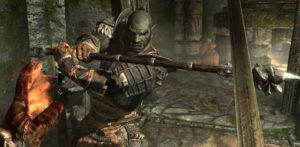
- Classes. I get that people like the D&D feel of being able to say “I’m a wizard”, “I’m a barbarian”, “I’m a ranger”, but in my opinion classes only matter in a multiplayer game. Your class gives your character a clear role within the party. That is the single function of this gameplay mechanic. In a video game where you’re the only player character in the entire world, classes are meaningless. If you want to be a barbarian, you can just choose to play as one, walk around with a naked torso and carry a battleaxe. If you want to be a mage, just focus on using magic. On the other hand, if you want to do something outlandish like playing a pacifist Orc with great stealth and lockpicking abilities, you can do that too. You don’t have to actually make your own class and give it a name. You can just play.
- Long, rewarding guild quests. This is probably the most unpopular viewpoint of all, but I think Bethesda made the right choice with the way they handled the guild quests in Skyrim versus Oblivion. A lot of fans say Oblivion’s questlines were better because you really had to work hard to become the head of, say, the Mages Guild. And that’s true. And I shudder at the thought of having to go through all of that again. The questlines are long, yes, but that doesn’t make them more fun. Sure, it’s unrealistic that you can become the Archmage at the phenomenal speed that’s possible in Skyrim, but if that’s what you want for your character, the option is there. It is not, however, the only option. Skyrim’s guilds all have tons of miscellaneous quests which allow you to really make the journey to becoming Archmage or head of the Thieves Guild much longer and more involved if that’s the story you want to tell with your character. But you don’t have to do any of that stuff if you don’t like it. And that’s one of the main things I like about Skyrim. Nothing’s ever a chore. In, say, Dragon Age: Origins, there are amazing quests that I love doing, like the Werewolf storyline with the Dalish Elves, but there are also very long parts that I hate to do and I have to push myself to get on with them, like the Circle Tower or the Deep Roads. Because of their great freedom, Elder Scrolls games manage to avoid that for the most part. Skyrim does it best, in my opinion. Where in Oblivion you have the long, annoying Oblivion Gates which you have to do to finish the main quest, in Skyrim you fight dragons, which is never a chore, because otherwise, why are you even playing a fantasy RPG? The only exception in my view is the Soul Cairn in the Dawnguard DLC, which is a pretty long sequence and a place I just want to get out of as soon as possible.
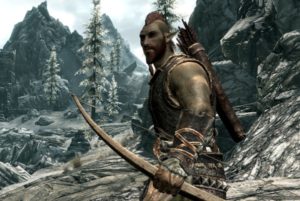
So what makes Skyrim actively better than Oblivion?
Well, let’s see. I think the setting is richer, more epic, more mysterious and more varied. The combat is more immersive and rewarding. There is a wider variety of things to do: you can build your own houses, decorate them with trophies and armour you don’t really use, get married, adopt some kids and live a life apart from being an adventurer. You can mine and smelt your own metals, craft your own gear from scratch (there is no smithing in Oblivion), become a werewolf, and so on. There is the whole Shout thing, which I love (learning words of power and collecting dragon souls to unlock them). The dungeons are much, much more varied and interesting than in Oblivion. There are many more quests and while people complain about radiant quests for being superficial, what they do is allow you to discover new places and go there for a purpose. The levelling system in Skyrim is vastly superior to Oblivion’s in my opinion. It’s simple and elegant but you get to make a decision every level that will immediately impact your gameplay experience and make you feel like you’re genuinely growing in power.
All in all, Skyrim allows you to imagine your own character and fill in the blanks with your imagination. It just requires some player restraint not to “powergame” their way through it and instead choose to use the game to tell a story for an audience of one. No other game offers that experience as well as Skyrim does. That, in combination with the magnificent Nordic setting, the epic vistas, the mysterious background lore and… the dragons… make Skyrim the Greatest RPG Of All Time, as far as I’m concerned.
Oh, and final note: I’ve been playing Skyrim for ten years and I’ve never used mods. To this day, I still don’t see the need for them. Perhaps I’ll give them a try if I ever do get tired of what I have now but I don’t see that happening any time soon. So if you are of the opinion that Skyrim is somehow unplayable without mods or something: nope. It’s awesome just the way it is.
